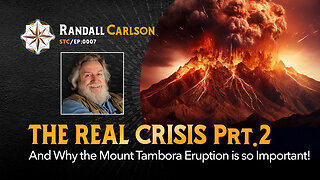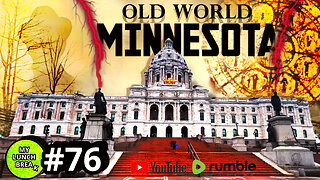Did Europe Destroy Native American Culture?
It is undeniable that Native Americans suffered terribly after the arrival of European settlers, but was this the result of malice or tragic inevitability? Jeff Fynn-Paul, professor of economic and social history at Leiden University and author of Not Stolen: The Truth About European Colonialism in the New World, explores what happened when the Old World met the New.
SUBSCRIBE 👉 https://www.prageru.com/join
Script:
Let’s say Columbus and his flotilla of three small ships never made it to the Western hemisphere. Do we imagine he would have been the last explorer to head west from Europe looking for a new trade route to India?
Of course not.
Once the New World was discovered, the maritime European powers—England, the Netherlands, Spain, and Portugal had a strong motivation to establish colonies. If they didn’t, they’d be at a competitive disadvantage to their rivals.
It’s human nature to move toward new opportunities. Often in frantic, haphazard ways. Think of the California Gold Rush. No one convened a conference and said, “How can we best extract gold from the American River without disturbing the natural beauty of the land?”
No, masses of people rushed into the area at the first opportunity.
So it was with the discovery of the New World. As soon word got out that the world didn’t end in an abyss somewhere in the middle of the Atlantic Ocean, fishermen and traders sailed across the sea on their own, in hopes of scoring a fortune.
Yes, their superior technology in firearms gave them an edge over Native Americans in a fight. But who wanted a fight? Most of these early adventurers did everything they could to avoid a confrontation.
Of course, no one anticipated that the natives would have almost no defense against the microbes that these adventurers brought with them. It wasn’t planned and it couldn’t have been prevented.
It just happened.
By the time Jamestown was founded in 1607, disease had already reaped its terrible toll.
Even before the Europeans arrived, the population of North America was sparse. Farming without draft animals and hunter-gathering can only support a tiny population at the best of times. In contrast, the barley, wheat, and rye culture of the Old World can support far greater numbers.
Add this to the fact that the population of Europe was rapidly expanding while arable land on the continent was declining and the movement west across the Atlantic was inevitable.
Nothing could have stopped it.
This brings us to the question of cultural adaptation and how it works. It is now commonly believed that Europeans destroyed Native Culture. The problem with that narrative is this: whenever a good idea comes along, one which clearly increases living standards, people tend to adopt it.
Even as they discovered America, Europeans were in the process of adopting dozens of superior Chinese inventions and ideas: paper money, gunpowder, pasta, and fine porcelain are only the most famous.
Should we accuse China of ‘cultural imperialism’ when they ruined ‘native’ Italian cuisine by introducing Marco Polo to spaghetti?
Likewise, Native Americans were quick to adopt the many useful Old World ideas which Europeans happened to carry with them.
Again, most of these had not even been invented by Europeans but had been adopted by Europeans from other cultures.
Why grind corn laboriously by hand for several hours a day, when you can use millstones instead?
Why hunt with bow and arrow, when you can use a rifle?
Why run when you can ride a horse?
Why not domesticate cattle when they provide huge boosts in caloric intake for your family?
Why refuse to adopt the wheel, for goodness sake?
By the time Columbus set sail the Old World had dozens of clear technological and institutional advantages, which for the most part, New World populations were eager to adopt as soon as they saw them.
View Full Script: https://l.prageru.com/47ERv3s
#europe #nativeamerican #history
-
 5:58
5:58
PragerU
6 days agoThe Fallen Soldier | 5-Minute Videos
10.3K9 -
 9:39
9:39
Tactical Advisor
1 day agoHow To Improve Your Shooting For FREE! Mantis Blackbeard X
70.2K14 -
 1:00:59
1:00:59
Squaring The Circle w/ Randall Carlson
1 day ago#007 The Real Climate Crisis Noone Is Talking About and Mount Tambora Pt 2
75K21 -
 13:52
13:52
America Uncovered
1 day agoEveryone is WRONG About Trump's Guilty Verdict
53.8K100 -
 13:10
13:10
Censored TV
1 day agoThe Owen Benjamin vs Jim Goad debate was WILD
66.2K44 -
 25:27
25:27
Degenerate Plays
21 hours agoThe Microtransaction Master - Call Of Duty Modern Warfare Remastered : Part 3
59.5K4 -
 21:03
21:03
MYLUNCHBREAK CHANNEL PAGE
1 day agoOld World Minnesota?
66.9K36 -
 5:49:05
5:49:05
Akademiks
1 day agoDrake Next Move - Whats next?? Did Lil Baby Listen to Me? Diddy and Family Preparing for Indictment?
122K57 -
 1:56:06
1:56:06
TimcastIRL
1 day agoTrump Raises RECORD $52.8 MILLION In One Day, Bonus Uncensored Show w/Laura Loomer | Timcast IRL
137K526 -
 23:19
23:19
Scammer Payback
5 days agoWe Created the First Ever 𝗔𝗡𝗧𝗜-𝗦𝗖𝗔𝗠 Call Center
234K273